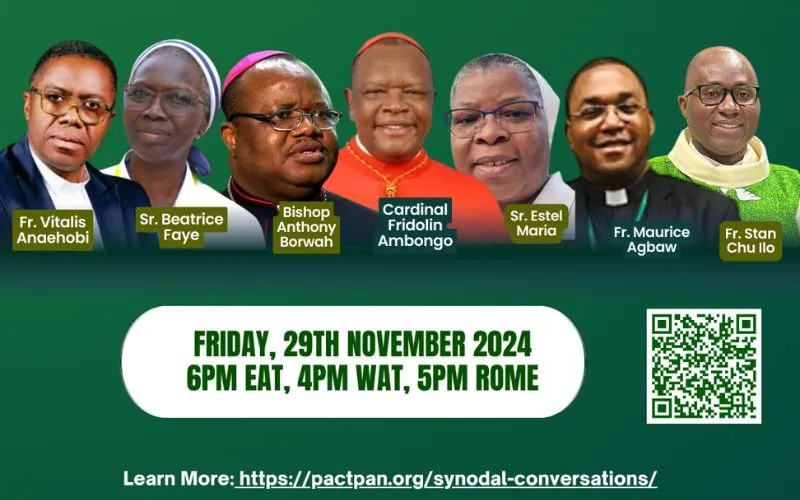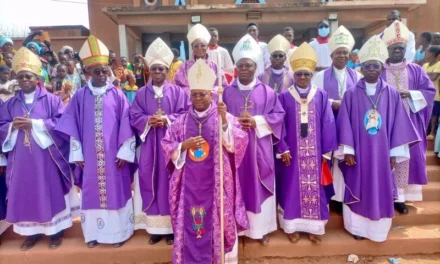“We are all equal”: SECAM President Calls for Reforms for “Disadvantaged” Women in Church, Society
Fridolin Cardinal Ambongo of the Catholic Archdiocese of Kinshasa in the Democratic Republic of Congo (DRC) has called for a re-evaluation of gender roles in African society and the Catholic Church on the continent, highlighting the “disadvantaged” position of women due to cultural traditions and entrenched attitudes within the Church.
Speaking at an online palaver that the Pan-African Catholic Theology and Pastoral Network (PACTPAN) and the Conference of Major Superiors of Africa and Madagascar (COMSAM) organized, Cardinal Ambongo reflected on how African cultures and Church practices have historically marginalized women.
“In our traditional cultures in Africa, a woman has always been considered as a person who has to take care of the household. It’s a good role. But the synod tells us, no, we are all equal. We have all been created men and women,” the Congolese Cardinal said during the November 29 virtual event that was themed “Journeying Together in Hope: A Special African Palaver on the Implementation of the Synod on Synodality.” Cardinal Ambongo attributed the imbalance to a combination of cultural norms and what he described as the tendency of the Church to prioritize men.
“In the Church, there is a certain mentality that says that a man is always in front. If you take these two factors—African culture, which disfavors women, and a certain mentality in the Church—it becomes clear that the African woman is doubly disadvantaged,” he said.
The Local Ordinary of the Catholic Archdiocese of Kinshasa in the DRC, which also serves as the President of the Symposium of Episcopal Conferences of Africa and Madagascar (SECAM) emphasized that the equality of men and women is rooted in baptism, calling for respect for women’s roles and opportunities.
He called for a shift in relationships to reflect this equality, advocating for societal and ecclesial reforms to empower women. In the November 29 webinar, Cardinal Ambongo addressed other aspects of societal imbalance, including respect for the elderly, the treatment of disabled individuals, and youth inclusion.
He challenged traditional beliefs that silence young people in the presence of their elders while urging older generations to act as responsible role models. “It’s not just about age but also about a model of behavior for the youngest,” he said, adding that mutual respect between generations is essential for balanced relationships.
The Congolese member of the Order of Friars Minor Capuchin (OFM Cap) also faulted the stigmatization of people with disabilities, saying, “Instead of considering disabilities as the work of the sorcerer or demon, how do we recognize and welcome these people as creatures of God?”
Cardinal Ambongo underscored the need for reforms in relationships not just among individuals but also among institutions. He advocated for stronger collaboration between African Dioceses, Congregations, and Episcopal Conferences, as well as a redefined relationship between the African Church and the Holy See.
“Our relationship with the Holy See must no longer exist as before. For us Africans, this is very important. It is our responsibility. If we want to be taken seriously, we must adopt consistent behavior,” he said.
Cardinal Ambongo underscored the need for formation, noting that to enter what he described as the “new synodal Church” the people of God in Africa must be formed.
“Let us form a synodal spirit, a synodal behavior, a synodal attitude, a synodal language between us,” the Congolese Cardinal said, and added, “This is why I say the synod on the synodality is a kairos for a new future for our African Church.”
Reflecting on the synodal process, Cardinal Ambongo said, “The synod is a vast project for us in Africa—whether it is for the life of dioceses, for the life of congregations, or the life of all lay faithful. Let us take courage and face this challenge with hope for a truly responsible and synodal African Church’s future.”
Also speaking during the November 29 webinar, Fr. Stan Chu Ilo, the Coordinating Servant of PACTPAN and Research Professor in the Department of Catholic Studies at DePaul University in the U.S. called on participants at the virtual event to reflect on the essence of relationships. He spoke of the African Ubuntu, the deep-rooted belief that ‘we are all connected.’
“We talk of the African Ubuntu, that we are all connected, we are all related,” Fr. Stan said, and posed, “How do we rebuild relationships in the continent, especially as we move into next year, talking about hope?” The Catholic Priest emphasized the importance of understanding hope through the lens of renewed relationships.
- CATHOLIC ARCHBISHOP IN GHANA HAILS POPE LEO XIV AS GOD’S GIFT - 23 mai 2025
- POPE LEO XIV TO APPROVE CANONIZATIONS - 22 mai 2025
- THE EVOLUTION OF PAPAL TRANSPORTATION - 20 mai 2025







